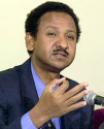INTERVIEW – Sudan’s foreign minister backs Darfur autonomy
By Georgina Cooper and Irwin Arieff
 UNITED NATIONS, Sept 27 (Reuters) – A top Sudanese official on Monday praised the idea of transforming war-torn Sudan’s government into a federal system with considerable autonomy granted to its states, including troubled Darfur.
UNITED NATIONS, Sept 27 (Reuters) – A top Sudanese official on Monday praised the idea of transforming war-torn Sudan’s government into a federal system with considerable autonomy granted to its states, including troubled Darfur.
Sudanese Foreign Minister Mustafa Osman Ismail, in an interview with Reuters, said a federal system along the lines of Germany, Nigeria, the United States or Canada would help the northeast African nation better cope with its vast size and ethnic and religious diversity.
“I personally believe that we need a sort of federal system, which we have already started,” Ismail told Reuters.
“We need to give it a strengthening. The people from Darfur state should have the right to have a parliament, to have a governor, to have a government to be elected by the people of Darfur,” he said.
The question of autonomy should be addressed when talks begin between the various warring parties on the country’s political future, after the fighting has ended and Sudan’s humanitarian woes have been addressed, he said.
Sudan, which is seven times the size of Germany, has been struggling in its western Darfur region with what the United Nations calls the world’s worst humanitarian crisis.
It has also been torn by a 21-year civil war in the south and multiple conflicts in other parts of the country.
U.N. High Commissioner for Refugees Ruud Lubbers said last week that Sudan would have to grant its Darfur region autonomy to end the fighting there that has forced 1.4 million people from their homes and killed 50,000.
“It’s clear there has to be some partition of power in Darfur,” the former Dutch prime minister told reporters in Chad, which hosts nearly 190,000 refugees from the conflict.
Lubbers said Sudan’s territorial integrity could not be called into question, and Ismail said he agreed that granting significant autonomy to the regions would if anything make a breakup of Sudan less likely.
“I don’t think we should worry if we have a stable government with enough resources,” he said.
Even the anti-government rebel groups in Darfur are not seeking their own state and in any case represent just 15 percent to 20 percent of the area’s population, he said.
The war in Darfur has its roots in tensions between Arab nomads and settled African farmers. Rebels who say they represent the settled population rose up against the government in early 2003 charging Khartoum had neglected the region.
Arab Janjaweed militias, who the rebels say are backed by the government, then went on a rampage, setting fire to villages, killing, raping and driving people off their land.
